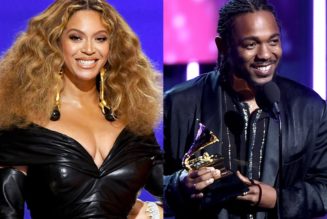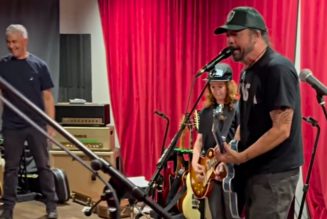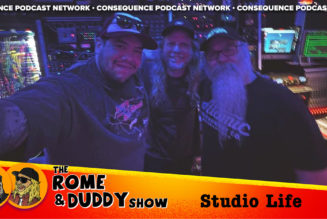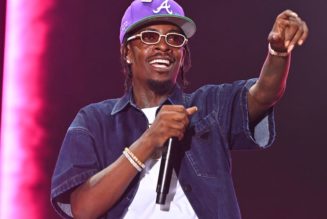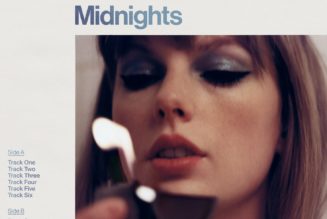Hypebeast is conducting a series of conversations with producers to learn more about the oftentimes overlooked musicians behind the mixers.
Though he’s best-known for his Grammy-winning contributions to Ye and Jay-Z’s “N*ggas In Paris,” Beyoncé’s RENAISSANCE and Nas’ King’s Disease, Hit-Boy’s first production placement was “Forever,” a song from Jennifer Lopez’s 2007 album Brave.
If your response to that was “Wait… I didn’t know Hit-Boy produced that,” that’s the exact response that fuels the producer’s artistry.
“My sound is not having a sound,” he shares. “I like throwing people off. I like making people say ‘Damn, I didn’t even know Hit-Boy did this.’”
And that versatile nature has been part of Hit-Boy’s career since those early days. Shortly after his contributions to Brave, he produced Gucci Mane’s “I Know Why” for Guwop’s Back to the Trap House tape. He dove deeper into his rap bag in the following years, solidifying himself as a force to be recocked with on Lil Wayne and Eminem’s “Drop the World,” A$AP Rocky’s “Goldie” and “1Train,” Kendrick Lamar’s “Backseat Freestyle,” and the track that put him on the global map, “N*ggas In Paris.”
However, as he harvested big-name rap collaborators and awards nominations for his high-octane hip-hop hits – from 2020 to 2023 he dropped off an impressive six albums with longtime collaborator Nas – Hit-Boy has refused to label himself as a hip-hop producer. If you take a scroll through his discography’s Wikipedia page, R&B and pop offerings are interspersed among the list, with cuts for Doechii, Don Toliver and Dom Kennedy complemented by deliveries for Selena Gomez, Khalid and Mary J. Blige.
“I’ve never put myself in a box,” he explains, refusing to impose any rules or regulations on his creative process. Though at one point in his career, he admits, he did try to. “After [the success of] ‘N*ggas in Paris,’ I tried to recreate that sound so many times, but I couldn’t.” Since then, he’s learned to “let it rock,” leaning into his adaptability and remembering that overthinking – especially in the search for sonic perfection – is the enemy.
“Some of the most successful beats have been the most simple,” he says – citing “N*ggas in Paris,” Drake’s 2013 track “Trophies” and last year’s “Delresto (Echoes),” a cut off of Travis Scott’s UTOPIA that featured Beyoncé as examples.
2024 is no exception, as Hit-Boy has already dropped off an impressive range of projects in the past nine months, the closest to home is Black & Whites, he and The Alchemist’s project in tandem with his long-incarcerated father Big Hit, who was released from prison earlier in the year. The father-son duo have found themselves in the studio nearly every day since then – as Hit-Boy says, “making up for lost time.”
Outside of the familial album, Hit-Boy has cranked out RENT DUE with LaRussell and Biggest Out The West with BlueBucksClan as well as offering up major contributions to The Game and Big Hit’s Paisley Dreams. After almost two decades in the industry, it’s clear he isn’t slowing down any time soon.
What was your first introduction to music production?
My dad was locked up, so I got into music through my uncle. He was doing a lot of dope stuff in the industry and it always intrigued me. When he’d play music, I found myself drawn to the melody. I would always hear the music more than I would hear the lyrics.
When did you start experimenting with production?
When I was 15, I started messing around with making beats on FL Studio and I fell in love. I taught myself a lot of it, but being around kids who grew up playing instruments really helped me.
When did you land your first placement?
My first placement was “Forever” on Jennifer Lopez’s Brave album in 2007.
What was that post-placement feeling like?
After that, I knew I always wanted to see my name in the credits. I’d bring my family to Best Buy and show them my name on the back of the CDs.
How would you describe your sound?
I wouldn’t even say I’ve got a sound. My sound is not having a sound. You’ll see that with my discography – it’s all over the place. I like throwing people off. I like making people say “Damn, I didn’t even know Hit-Boy did this.” I was always dabbling in a range of beats – rap, pop, RnB. I was always exploring. I’m a fan of so many different types of music so I never wanted to lock myself into just one style.
How would you describe your approach to building a track?
Every artist has their own process, so it can go a bunch of different ways. But honestly, some of my most successful songs have stemmed from me not having any direction and just having fun. The first step is always finding a sound, sample or instrumental that feels right to me.
How do you know when it feels right?
I gotta feel it in my soul.
What’s the most difficult part about being a producer?
I always say that the producer has to take the most rejection out of anyone. You may have to put 30-40 beats in front of an artist for them to say yes to just one. But that’s the beauty of it. You have to find what works for an artist in that exact moment.
Were there ever times you thought about giving up?
No. I still have to deal with it. Sometimes I get it right on the first time, but there are still plenty ot times when I have to play 20 beats for an artist until we find the one. It’s exhausting but it’s part of the process.
Did you have a track that served as your “I Made It” moment?
Most definitely “N*ggas in Paris.” It was a lot of different moments within that one moment.
Why do you think that song blew up the way it did?
The simplicity of it. The easiness. The sound and the textures are just perfect. It’s a perfect combination of everything. Some of the most successful beats have been the most simple. I think finding that simplicity that allows a song to be played over and over and over again without getting old has been key.
Why do you think you’ve remained a staple in the production space for so long?
My curiosity. I’ve never put myself in a box. I tried to, honestly, at one point. After “N*ggas in Paris,” I tried to recreate that sound so many times but I couldn’t. I later learned that my longevity comes from the diversity of my body of work.
“If something feels good, it feels good and I just gotta let it rock. I can’t overthink it.”
Are you a perfectionist?
I used to be, but I’ve really had to let my perfectionist nature go. If something feels good, it feels good and I just gotta let it rock. I can’t overthink it.
Do you ever feel underappreciated as a producer?
For sure. I feel like pretty much all producers feel that way.
Tell me more about working alongside Nas.
Nas gave me the opportunity to express myself creatively. He never boxed me in and he listened to every single one of my ideas.
Are there any other artists who you’ve worked with who’ve left a significant impact on you?
Definitely Beyoncé. I spent a whole summer working with her and seeing someone lock in at that high of a level was just … wow.
How do you decide who to collaborate with?
I work with people who I genuinely f*ck with and make really good music.
What’s it been like being able to finally get to record and make music with your dad?
This is something we’ve been wanting to do for a long time. We started recording right when he got out because we’re making up for lost time. We want to put our story and our reality out there.





